Exploring Japanese Culture: Not Inscrutable After All by Nicos Rossides

Author:Nicos Rossides [Rossides, Nicos]
Language: eng
Format: epub
Publisher: Matador
Published: 2020-03-26T00:00:00+00:00
Capsule Hotel, Osaka.
(Photo by J. Miers, Wikimedia Commons â CC BY-SA 1.0)
Kissatens: Extended Living Space
Many people use the ubiquitous kissatens (coffee shops) as extended living space, or to borrow from the founding CEO of Starbucks, a âthird spaceâ between work and home, combining elements of both. Big-city space is at a premium, so people often use coffee shops as their workspace or a place to socialize. There is no clear distinction between work and a variety of entertainments, be it part of a business or personal relationship. Rather than invite you to their home, many Japanese prefer to entertain outside which may also be seen as redistributing income to the less skilled. In the early â80s, there was a tax charged on all meals over 3,000 yen. In order to avoid the âluxury tax,â people would eat and drink until just below the threshold, and then continue their drinking at another venue: an intriguing way of distributing patronage. It would certainly seem strange in the West to enter a coffee shop and see suited businessmen napping on the tables. But in Japan, the price of an expensive cup of coffee also buys a temporary office, and a generous supply of gossip mags or comic books, far enough from the âmadding crowd.â
I fondly remember my own experiences at HonyaradÅ, my favorite morning hangout during the early â80s. This is where I would enjoy my breakfast (or morningu, from the English âmorningâ) often in the company of like-minded expats like Professor Jan Gordon (who wrote the Foreword to this book) and other close friends like Sidney Atkins, an American geographer doing post-graduate work at KyÅdai. For only slightly more than the cost of a cup of coffee youâd be offered a strong (and delicious) brew, freshly baked buttered toast, a hard-boiled egg, and a small salad. The perfect light breakfast before starting the day and sometimes, later in the day, a quiet space to write parts of my dissertation.
Gift Giving
Gift giving is an important ritual when dealing with the Japanese, particularly in business contexts. When visiting the head offices of a Japanese corporation, taking a gift is part of the expected protocol, with clear rules regarding to whom, how, and when it should be given. As with many aspects of their culture, itâs ritualized with norms and practices that govern it, typical in a society where uncertainty avoidance is high. These practices typify reciprocity, generosity, and respect.
Consequently, there are prescribed rules on what kind of gift to give, how to give it, and when. Avoid surprising your host, while also not appearing to time your gift giving with an expectation of reciprocal action (although this is widely practiced). Letâs look at the ritual in more detail.
Download
This site does not store any files on its server. We only index and link to content provided by other sites. Please contact the content providers to delete copyright contents if any and email us, we'll remove relevant links or contents immediately.
Annapurna by Maurice Herzog(3455)
Liar's Poker by Michael Lewis(3432)
A Forest Journey by John Perlin(3055)
Atlas Obscura by Joshua Foer(2940)
The Ogre by Doug Scott(2667)
Cuba by Lonely Planet(2618)
Photographic Guide to the Birds of Indonesia by Strange Morten;(2520)
The Splendid and the Vile by Erik Larson(2447)
Tokyo by Rob Goss(2417)
All Things Reconsidered by Bill Thompson III(2381)
Fatal Storm by Rob Mundle(2206)
INTO THE WILD by Jon Krakauer(2187)
A TIME OF GIFTS by Patrick Leigh Fermor(2187)
Trail Magic by Trevelyan Quest Edwards & Hazel Edwards(2164)
DK Eyewitness Top 10 Travel Guides Orlando by DK(2163)
Touching the Void by Joe Simpson(2122)
Top 10 Dubai and Abu Dhabi by DK Travel(2083)
Abbey in America by Murray John A(2070)
Lonely Planet Australia by Lonely Planet(2067)
